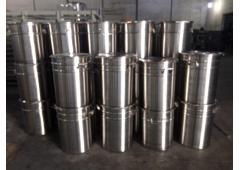What Are the Safety Benefits of Using Steel Containers in Industrial Settings?
Description
The Role of Steel Containers in Industrial Automation: Enhancing Efficiency & Safety
Industrial automation has revolutionized manufacturing and logistics, bringing about significant improvements in efficiency, accuracy, and safety. One of the often-overlooked yet crucial components in this transformation is the steel container. These robust storage and transport solutions play an indispensable role in automated industries by providing secure, durable, and efficient means of handling materials and products. In this article, we explore how steel containers contribute to industrial automation, improving both efficiency and safety across various sectors.
The Importance of Steel Containers in Industrial Automation
Steel containers are widely used across industries, including manufacturing, logistics, food processing, ******ceuticals, and construction. Their durability, recyclability, and ability to withstand harsh environments make them a preferred choice for automated systems. In industrial automation, where precision and reliability are key, steel containers market offer multiple advantages, such as protection of sensitive components, efficient material handling, and enhanced workplace safety.
Enhancing Efficiency with Steel Containers
Streamlined Material Handling
Automation in industries relies heavily on efficient material handling systems. Steel containers, with their standardized designs and modular capabilities, facilitate seamless integration with robotic arms, conveyor belts, and automated guided vehicles (AGVs). Their ability to stack and interlock ensures optimized space utilization in warehouses and production facilities. This not only reduces manual labor but also minimizes errors and delays in material transport.
Optimized Storage Solutions
Proper storage of raw materials, semi-finished goods, and finished products is vital for smooth industrial operations. Steel containers provide a reliable storage solution that protects materials from environmental factors such as moisture, dust, and extreme temperatures. Their strong structure ensures long-term durability, making them ideal for automated storage and retrieval systems (ASRS) in large warehouses and manufacturing plants.
Standardization and Compatibility
Industrial automation thrives on standardization. Steel containers are designed to fit global standards, making them compatible with a variety of automation equipment. Whether in robotic assembly lines or automated distribution centers, these containers can be efficiently loaded, transported, and unloaded without requiring modifications to existing systems. This standardization significantly reduces downtime and increases productivity.
Improved Inventory Management
Advanced industrial automation incorporates sensors and tracking technologies such as RFID and IoT. Steel containers equipped with these technologies enable real-time monitoring of inventory levels, reducing the chances of stockouts or overstocking. Automated tracking also improves supply chain visibility, allowing businesses to optimize logistics and reduce waste.
Faster Turnaround Times
The strength and reliability of steel containers enable quicker handling and transport of goods. Unlike plastic or wooden alternatives, steel containers do not break or deform under heavy loads, ensuring uninterrupted workflows in automated environments. Their reusability and long lifespan further contribute to cost savings and efficiency in industrial operations.






Useful information
- Avoid scams by acting locally or paying with PayPal
- Never pay with Western Union, Moneygram or other anonymous payment services
- Don't buy or sell outside of your country. Don't accept cashier cheques from outside your country
- This site is never involved in any transaction, and does not handle payments, shipping, guarantee transactions, provide escrow services, or offer "buyer protection" or "seller certification"






